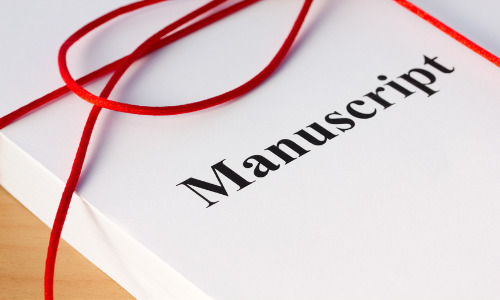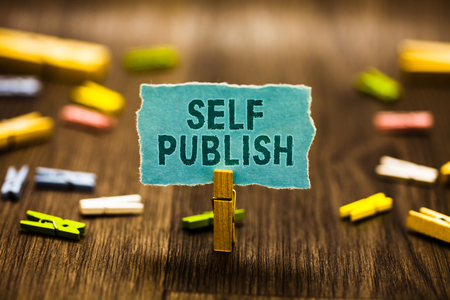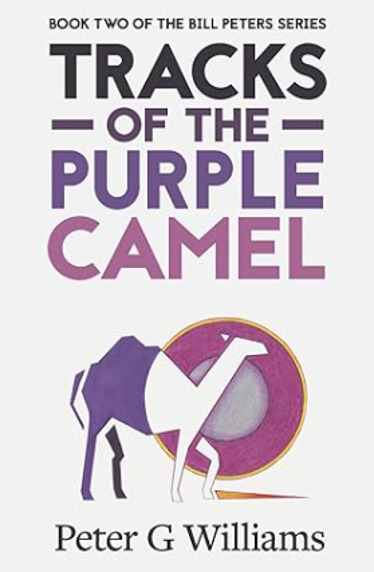
The quote "Everyone has a book in them" is often attributed to American journalist Christopher Hitchens, who reportedly said it during a conversation with colleagues. The full phrase, or a similar version, was, "Everyone has a book inside them, which is exactly where it should, I think, in most cases, remain," according to a post on selfpub.com.au.
“A person who publishes a book wilfully appears before the populace with his pants down. If it is a good book, nothing can hurt him. If it is a bad book, nothing can help him.” Edna St. Vincent Millay
“Once, if you told people you were self-published, they'd look at you like you were a smelly old jobless hobo just come off a dusty boxcar with soup can shoes and a hat made from a coyote skull.” Chuck Wendig, 500 Ways to Write Harder
I always believed that with my background in law enforcement, prisons, and working as a private eye for over 30 years, I surely had a book in me. Turns out I did, and now my crime/adventure Tracks to Exile and Tracks of the Purple Camel has resulted in two self-published novels of around 110,000 words, both available on Amazon. The next four books in the series are written but remain in manuscript form, awaiting publishing. Obviously, I’m just waiting for Netflix, HBO, or Stan to recognise my literary brilliance and turn the series into an Antipodean cable TV crime/adventure hit, bringing me fame, obscene wealth, and babes. Never forget the babes!
Look, I’m sure some, if not all, of you have known for years that you have a book in you. A tale, either fact or fiction, drawn from your life’s adventures and misadventures. (Hello Fifty Shades of Grey, not to mention Harry Potter.) There’s no better time than now to write that story, because let’s face it … you’ll be a long time dead.
Speaking from experience, I knew I had a series of fictional crime adventures brewing in my mind and to be honest, nearly all of them involved amazing sex scenes woven among the crime and carnage. After the loss of a business, a forced home sale, and the breakdown of a marriage, all one after the other, I was understandably stressed, and stress messes with your sleep. To cope, I wrote the first book in my head each night as I lay in bed, often drifting into dreams that continued the story. When I finally sat at a computer, it felt like a massive artistic release. My two fingers flew across the keys. I'd mentally plotted the stories and outlined each book roughly on paper with chapter headings. As I wrote, the plot naturally developed, often leading to unexpected directions.
I write in total isolation: lights off, coffee on, no distractions. I write for a few hours every morning. On one weekend, I wrote 30,000 words in what felt like a stream of consciousness, the story was already written in my mind, and I just needed to let it out through my fingers. To give that some context, a typical novel runs about 100,000 words.
Here’s my advice: once you’ve written your rough first draft, put it aside. Come back to it a week later and read it—out loud if possible. I even use different accents just for fun. You’ll find yourself editing it for the first of many rounds. Don’t be precious it’s unlikely to be a masterpiece on the first go. Rework it again and again. I had a habit of over-describing and over-explaining until a wise editor gave me the golden rule: “Show it, don’t tell it.”

Once you have a spell-checked, presentable draft, print off a couple of manuscripts and give them to people you trust. Ask for brutally honest feedback, and then wait in nervous anticipation (with your pants down) for their opinion. I remember asking a respected rugby club mate who also happened to publish school books if he’d be kind enough to read my manuscript. I still recall his sigh and reluctant “Jeez… oh, OK, Magnum.” A few weeks later, he tracked me down at the club and said, “Look, it’s actually quite good. Keep going with it.” I was stoked.
My next step was Google. I found contact details for a professional literary assessor recommended by a major publisher. For a few hundred bucks, I had the manuscript assessed. The report was encouraging and full of useful grammar and structure suggestions.
After reworking the manuscript based on her advice, I sent it back to her and paid again for her review. Another promising report. More editing. Then I printed more copies and expanded my circle of readers.
With positive feedback, not just from friends and family, I hired a professional literary editor. For several thousand dollars, she polished the manuscript, fixing countless grammatical errors and highlighting how often I changed tense (sometimes multiple times on a single page!). You learn so much from expert eyes.
By now, a year had passed since I first took the book seriously. Persistence is key. I submitted my manuscript to several major publishers. One responded, inviting me to submit. Months later, I received this: “Although this is an accomplished work, we do not believe we can currently place it for publishing.” While the rejection stung, I was thrilled they called it “accomplished.”
Encouraged by two close mates who offered to finance a self-published version, I returned to my editor. For all the work, edits, formatting, and cover design the total cost came to around $10,000.

Once agreed and paid for, the process took a few months. Suddenly, my first book Tracks to Exile was live on Amazon. Woohoo! Proud as, bro. I was officially an author.
This was pre-digital. We had 1,000 copies printed for about $5,000. I remember collecting boxes from my editor’s home in Mundaring. My Holden was so loaded that it scraped up my driveway, tearing a massive hole in the fuel tank and spilling 50 litres of petrol across Curtin Ave, Cottesloe. Luckily it was a stinking hot day and there was no suburb diminishing explosion as the gas evaporated!
We sold all 1,000 copies over the next year. The famous Kiwi Shop in Joondalup sold 300. My accountant bought 100 at the launch to give to clients for Christmas. Being self-published, no bookshops would carry it, although, out of the blue, Margaret River Bookshop (of all places) ordered two copies. Go figure.
But that’s the challenge for self-publishers: marketing and distribution. Yes, your book can sit on Amazon alongside hundreds of thousands of others. Still, Amazon is a brilliant platform. Today, you can upload a PDF and print a single copy or a million. Amazon converts your book to Kindle and offers global sales options in the USA, UK, Germany, France, Japan, and beyond. Once on Amazon, you can buy your own book for about $9 and sell it for $25, if you find someone to pin down.
With everything set up, you just wait for the monthly cheques to roll in from Amazon (hopefully).
“99% of self-published authors will never make any money with their books.” Oliver Markus Malloy, The Ugly Truth About Self-Publishing

Ignore Malloy. Prepare your Plan A. Write that damn book! So what if the world doesn’t immediately see your genius? It’s on you to push sales. Always have a Plan A, B, and C. My Plan A is complete: I wrote and self-published the first two books in my series. Book 2, Tracks of the Purple Camel, was funded by my late parents’ inheritance to me.
Plan B? Land a deal with Netflix or Stan to turn Tracks into a gripping Antipodean TV crime series. I just need the right person to hear the pitch.
While I wait for fame and fortune, here’s my challenge to you: take Step 1 of your Plan A. Sit down and start writing. It’s deeply satisfying and well worth the effort. Given this blog is hosted on Langtrees VIP, chances are you work in or around the sex industry. Well, sex sells and that part of your journey, might just be the hook that grabs a real publisher’s attention.
More Wise Words
“We can’t be everything for our book. Sometimes, we must surrender it to people who can help. It’s all about the book. It’s not a reflection of your competence. But, please ask from the right people. Hire the right people. Approach experts. Friends are great for moral support, but when you need expertise and advise, then ask the experts. Otherwise, you’d be a blind man being guided by another blind man telling you which way to go. A practice that is too common in this industry.” Eeva Lancaster, Being Indie: A No Holds Barred, Self Publishing Guide for Indie Authors
“When I cannot reason with my mind, I write with my heart and soul.” ― Div Manickam, A Book is Born: Guide to self-publishing.
Start writing for your heart and soul and good luck.
Author: Magnum (Author)
For: Langtrees.com
TalkinSex Forum | Perth Escorts | Sydney Escorts | Melbourne Escorts | Brisbane Escorts | Darwin Escorts | Adelaide Escorts | Hobart Escorts | New Zealand Escorts

“Lana and I have been talking for years about writing a book maybe it's time we started??? ”

“This was such an inspiring read! It reminded me that everyone really does have a story worth telling, whether it’s fiction, memoir, or reflections from life’s wild chapters. Thank you for sharing your journey and practical advice on self-publishing.”

“Loved this — such an encouraging reminder that the hardest part is just starting. Your honesty about the process (and the fear) makes it feel far more achievable, especially for people who’ve lived full, complex lives and think they’ve “missed the window.” Write, baby, write is exactly the push many of us need. Thanks for sharing your journey and the motivation.”

“Writing can be so cathartic, good on you for self publishing, Magnum, and encouraging others to do the same. There are some great books written by sex workers, 'Hooked" by Sydney sex worker Samantha X is a great read. I wish Mrs Langtrees would write a book, now that would be a great read! ”

“Very inspiring Magnum, I am currently getting back into my "manual/book" that I have been slowly gathering and creating since 2019. I was blocked on where to take it but one day a clear mind and a long drive lead to to an epiphany that told me exactly what to do and now the physical process it coming together, May I ask for some advice from an published author as your self in the near future?.... Alana XXX ”

“what an inspiring story. I liked how you describe the real process behind writing and publishing, without romanticizing it. It truly motivates people to overcome their fear and just start writing. Thank you for sharing it with all of us ??”

“We talk about this all the time! I always tell myself to write a book or even just journal about this part of my life while I am in the industry so I have something to look back on because it has definitely been a wild ride!! ”

“I love this post! Thank you for sharing with us Magnum. I’d love to see a personal memoir from Mrs Langtrees herself! Surely a best seller and I know for sure we would all be buying that one! Also Mia, I relate to your comment on such a personal level. I have experienced similar themes and also long thoughts and consideration on the structure of writing as there truely seems to be so so many things to include that has shaped my experience until now. I write in my spare time, mostly songs, poetry and essays to my Substack platform on how I experience life as a creative, but trying to condense a life so animated has lead me to think about starting a YouTube channel as I post a lot of personal commentary content on my social media platforms anyway. I’d love to share (as the my most expressive self) videos about life as someone who is spiritual, 2 years sober and a FSSW. My friends and family support me in all these fields and I’d love to open the conversation up to a wider audience! Thank you for sharing this post!”

“I’ve honestly always felt like I should write a memoir one day. I’ve had such an interesting life with so many twists, phases, people, places, highs, lows, and completely wild chapters that feel like they’d belong in a book. The only thing that stops me is not knowing where I’d even begin or end, or how to choose what to include. There’s been so much that trying to shape it into a story feels almost harder than the writing itself. Sometimes I wonder if I should start from childhood, or from the most dramatic moment, or even write it in themes instead of a timeline. There’s just been so much growth, heartbreak, reinvention, and so many unexpected plot twists that choosing what version of my life to tell feels overwhelming. I definitely think there’s a memoir in me — I just need to figure out how to untangle it and decide which parts deserve to be told first.”

“Writing a romance novel myself this is very helpful insight that I will need when I finish my book one day so thank you. Well done on your journey! ”

“Writing a book was not hard, getting it out there was another story”

“Another great read, Magnum. We hear so many wild, raw, and downright beautiful stories in this line of work. Honestly, some of them deserve to be books. Writing it all out sounds like the best kind of release. Might be time one of the girls gives it a crack… now that would be a bestseller.”

“Loved this! A great reminder that everyone has a story to tell. Starting can be hard, but this gave me the motivation to begin. Write, baby, write! ✍️? ”